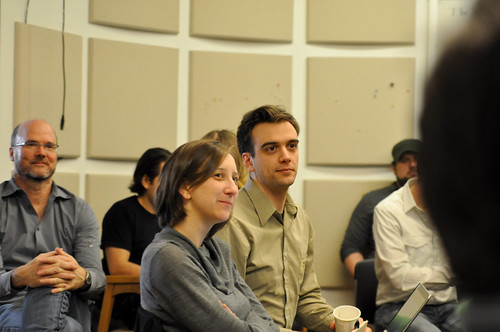Arduino Uno Punto Zero Meeting in NYC
It was a busy week in NYC for the team last week. We attended an open source hardware meeting, had two days of advisory meetings and several team meetings, an Arduino NYC community meetup, visited NYC Resistor and Adafruit’s offices, and threw in a couple of social events as well. Exhausted by the pace, but energized by the ideas, we came out of it feeling good about the road to Arduino uno punto zero.
The week started with a morning team meeting to say hello and schedule the week, then an open source hardware meeting at Eyebeam, hosted by Ayah Bdeir, creator of LittleBits. Ayah gathered a good group of people to discuss the topic, ranging from makers of open source hardware to some great legal minds on open source.Among the attendees: Limor Fried, Mako Hill, Bunnie Huang, Jonathan Kuniholm, Zach Smith, Becky Stern, Phillip Torrone, Shigeru Kobayashi, John Wilbanks, Thinh Nguyen, Ted Ullrich, Celine Assaf, Alicia Gibb, Ben Leduc-Mills, Paul Rothman, and several others I’m forgetting (sorry!) The meeting featured talks by folks from Creative Commons about legal issues related to the business of open source hardware, including copyrights, patents, trademarks, and open source licenses. Thien’s presentation in particular helped everyone to gain a better understanding between these various legal tools and instruments, and how they apply to open source hardware. The discussion was lively, and many good ideas emerged.

The discussion for Uno Punto Zero has been going on in lots of places, and with lots of people. In order to bring the threads together, we spent Thursday and Friday meeting with a couple dozen people from across the Arduino community. We talked about the issues that have come up relating to the whole user experience: the hardware, the development environment (IDE), the language (API), the web, documentation, and online community tools.

Among those attending besides the team were Leah Buechley, creator of the Arduino LilyPad; Shigeru Kobayshi, maker of Gainer, Funnel, and the Arduino FIO; Limor Fried and Phillip Torrone of Adafruit and MAKE; Zach Smith of Makerbot; James Tichenor and Joshua Walton from the Rockwell Group Labs; Ayah Bdeir of LittleBits; Chris Anderson, editor of Wired and maker of the ArduPilot; Michael Margolis, author of the upcoming Arduino Cookbook, and developer’s list regular; Mikal Hart, author of NewSoftSerial, and developers list regular; Bjoern Hartmann, UC Berkeley professor and developers list regular; Igor Gonzalez Martin, a leading voice and early translator for the Arduino Spanish language forum; Kate Hartman, co-creator of Botanicalls; Nathan Seidle, CEO of Sparkfun; Jennifer Magnolfi, interactive environments creator for Herman Miller; Sharnon Tulabadi and Ken Brown from Gravitech; J. Eric Townsend, interaction designer and developers list regular; and form the ITP faculty Dan O’Sullivan, Danny Rozin, Hans-Christoph Steiner, Eric Rosenthal, Rob Faludi, Clay Shirky, John Schimmel, and Zach Eveland and ITP resident reseachers John Dimatos, Matthew Parker, and Tymm Twillman (and if I forgot anyone, forgive me!).

We got great feedback, ideas echoing what has already been discussed in the various online fora, as well as new ideas based on people’s personal experiences, their colleagues’ experiences, and their companies’ experiences. We came away from the meetings with a lot of work to do, but a clear idea of what we want version 1.0 to look like. In the coming weeks, you’ll see that reflected in various announcements and changes here on the Arduino site.
During the meetings, we announced a new member of the Arduino hardware line, the Arduino FIO, designed by Shigeru Kobayashi and Nathan Seidle, based on Leah Buechley’s work on the LilyPad. Originally developed as an extension of Kobayashi’s Funnel project, this new board is a great connection between these two projects, and a powerful tool for using Arduino with XBee radios.

On Saturday, we had a great time meeting people from the local community of Arduino users and seeing things they had built, talking about plans and hopes, and just getting to know people. The day was relaxed and a lot of fun, and ended with drinks at a local pub.
Sunday morning we wrapped up with one last team meeting to start to develop a work plan for uno punto zero, and to discuss our plans as a company as well. Look forward to changes that we hope will keep Arduino healthy and growing in the coming years.
More photos of the week’s events can be found at this Flickr link.



Thanks very much to everyone who made this past week work out so well: to Red Burns and the students, faculty, and staff of the Interactive Telecommunications Program at the Tisch School of the Arts, NYU, for hosting our meetings; Ayah Bdeir and Eyebeam for hosting the open source hardware meeting, and for inviting us; NYC Resistor, for inviting us to their space, and for participation in multiple meetings and from multiple people throughout the week; Limor Fried and Phil Torrone at Adafruit, both for their good advice and for inviting us to see their shop; to Jennifer Magnolfi for helping with social coordination for various events during the week; to all the folks who came to the advisory meetings and the community meetup, and the various social events. It was a remarkable week, and we know it will lead to a solid Arduino version uno punto zero (1.0) on which to build the future.
May 7th, 2010 at 11:05:12
[…] 1.0 notes from the Arduino uno meeting, good stuff and interesting to see what’s ahead. Filed under: arduino — by adafruit, […]
August 22nd, 2010 at 15:26:00
[…] the Arduino Uno meetup at ITP, NYU, I had the chance to be introduced to Paola’s and Cecilia’s ideas on the use of paper […]